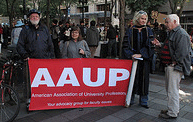The mission of the UW Chapter of the American Association of University Professors (AAUP) is to advance academic freedom and shared governance; to define fundamental professional values and standards for higher education; to promote the economic security and working conditions of all categories of faculty, academic professionals, graduate students, post-doctoral fellows, and all those engaged in teaching and research in higher education; to develop the standards and procedures that maintain quality in education; to help the higher education community organize to make our goals a reality; and to ensure higher education’s contribution to the common good. Founded in 1918, the chapter has worked with allies to shape public higher education in Washington State by opposing privatization and corporate control, promoting diversity and equity, and advocating for accessible, high-quality education.
Promoting academic freedom, shared governance and tenure
 Since 1915, AAUP has been the guardian of academic freedom, shared governance, and tenure at the University of Washington and universities throughout the United States. The UW chapter was founded in 1918 and helped create the Faculty Senate and the system of tenure at UW. It also has contributed directly to the University’s reputation as a premier institution of higher education.The chapter helped create the Faculty Senate, the Faculty Code, and system of tenure (see History) and protecting and strengthening those institutions remain its core mission today. The names of AAUP members today grace some of the campus’s best known buildings. Professors Padelford, Parrington, Savery, McMahon, and Smith were all members of AAUP.
Since 1915, AAUP has been the guardian of academic freedom, shared governance, and tenure at the University of Washington and universities throughout the United States. The UW chapter was founded in 1918 and helped create the Faculty Senate and the system of tenure at UW. It also has contributed directly to the University’s reputation as a premier institution of higher education.The chapter helped create the Faculty Senate, the Faculty Code, and system of tenure (see History) and protecting and strengthening those institutions remain its core mission today. The names of AAUP members today grace some of the campus’s best known buildings. Professors Padelford, Parrington, Savery, McMahon, and Smith were all members of AAUP.
A national and campus level organization
AAUP operates on both a national and campus level, sustained by the 45,000 members whose dues insure that faculty will have a strong voice. The national office in Washington D.C. coordinates activities on many  fronts. When Congress considers higher education bills, AAUP is there to lobby and advise. When state legislatures write their budgets, AAUP is there. When journalists look for data and information, AAUP is where they turn. When individual faculty are involved in employment disputes, they call AAUP, which helps resolve more than 1,000 cases each year. Most importantly, when college and university administrations do things that threaten academic freedom, undercut shared governance, or violate faculty codes, they know that AAUP will be there, ready to defend practices that the organization helped invent.
fronts. When Congress considers higher education bills, AAUP is there to lobby and advise. When state legislatures write their budgets, AAUP is there. When journalists look for data and information, AAUP is where they turn. When individual faculty are involved in employment disputes, they call AAUP, which helps resolve more than 1,000 cases each year. Most importantly, when college and university administrations do things that threaten academic freedom, undercut shared governance, or violate faculty codes, they know that AAUP will be there, ready to defend practices that the organization helped invent.
Establishing standards
Over the years AAUP committees have established standards that are recognized by most institutions of higher education. These include the 1940 Statement of Principles on Academic Freedom and Tenure, which is understood around the world as the bedrock for legal reasoning about Academic Freedom. They include policy statements about governance practices of Colleges and Universities that anchor systems of shared governance in most u niversities, including UW. These and other policy statements help shape best practices and foundational understandings for universities and colleges across the United States and beyond. They are compiled and published on policy page of the AAUP website and in the famous AAUP Redbook. Universities are urged to bring their practices into compliance with these standards. When violations are flagrant and the issues warrant, an offending institution can be subject to AAUP censure.
niversities, including UW. These and other policy statements help shape best practices and foundational understandings for universities and colleges across the United States and beyond. They are compiled and published on policy page of the AAUP website and in the famous AAUP Redbook. Universities are urged to bring their practices into compliance with these standards. When violations are flagrant and the issues warrant, an offending institution can be subject to AAUP censure.
A data resource for higher education
AAUP is a communication center and data resource for higher education. The national office publishes Academe, a bi-monthly magazine, and the new publication AAUP Journal of Academic Freedom. Also critical is the Annual Report on the Economic Status of the Professionwhich policy makers, faculty and administrators rely on each year for comparative data on the salaries of faculty at universities and colleges across the country.
Promoting communication among faculty
The chapter maintains the Faculty Issues and Concerns email listserve. More than 1,300 UW faculty members and librarians rely on it for news and discussion of campus and national issues.
Other chapter activities
The chapter helps faculty who seek advice regarding disputes, grievance procedures, including adjudication.
Ongoing commitments include:
- promote discussion about collective bargaining as a resource for UW faculty
- redress gender and racial inequalities
- establishing a fair faculty salary policy and to raise salaries to a level competitive with peer institutions
- resist the further degradation of the tenure system
- expose and contest the casualization of faculty positions and the exploitation of contingent faculty.
- monitor online and distance learning initiatives
For more information click on the links and buttons above and left.
Because Academic Freedom is not free, it is important that AAUP has the members and the funds to continue its work. Please join. For membership information click here
Meetings are held each month. Members, other faculty and librarians, and invited guests are welcome.
